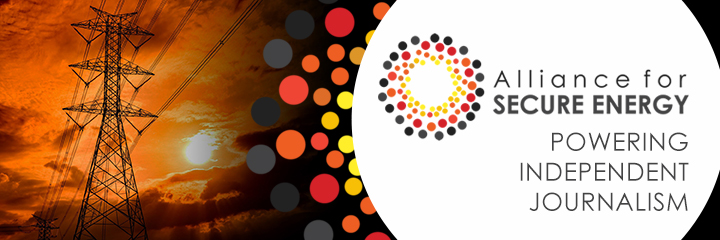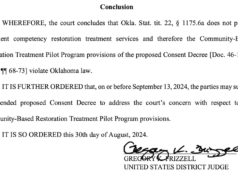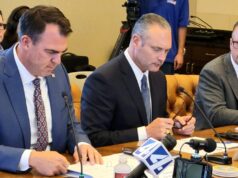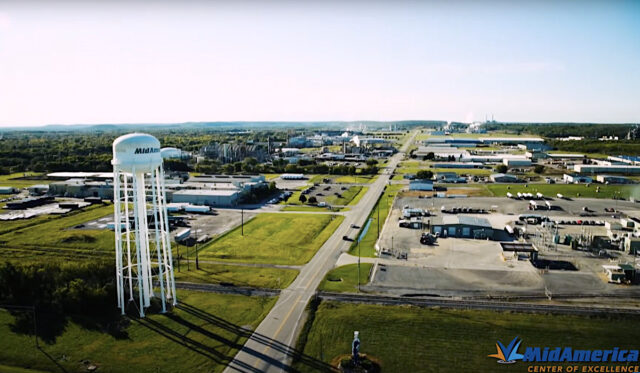
(Update: As part of its Fiscal Year 2024 budget agreement, the Oklahoma Legislature approved a $145 million appropriation to the Oklahoma Department of Commerce in support of Panasonic’s proposed development. The following article remains in its original form.)
With negotiations over a proposed Panasonic electric-vehicle battery plant slowed by a broader legislative stalemate, combustable questions about a potential agreement with the Japanese mega-manufacturer have sparked examination of how Oklahoma has handled business recruitment efforts. Now, with the Legislature debating whether to make an additional $245 million infrastructure investment “for the benefit of the company,” the Oklahoma Department of Commerce’s executive director has decided to resign.
After a private conversation with Gov. Kevin Stitt on April 28, Brent Kisling submitted a letter May 1 saying he will resign June 8 after four years leading the state’s economic development agency. As Panasonic negotiations reach a crossroads, Kisling insisted his agency has been smooth and efficient like “a well oiled machine.”
“The Commerce staff, specifically the leadership team, is the most professional group of leaders I have ever experienced and have created the most responsive agency in all of state government,” Kisling wrote. “There has never been even a question about the financial and legal decisions made by this team during my time at Commerce, and as long as this team stays in place, there never will be. The Department of Commerce is a well oiled machine.”
Kisling’s parting declaration landed May 1 in a precarious legislative landscape. Four days prior, the Senate Rules Committee had rejected Stitt’s nomination of investment firm manager Chad Mariska to be secretary of commerce in Stitt’s Cabinet.
“There is frustration that we cannot land economic development projects, so we need to get the attention of Commerce,” Senate President Pro Tempore Greg Treat (R-OKC) told media.
Two weeks earlier, Treat’s special Senate committee examining economic development efforts had peppered Kisling and his staff with questions April 13, two days after Kisling and a Panasonic executive had signed a “development agreement” featuring four contingencies. Although they were told of the conditions — including an additional $245 million legislative appropriation — some leading lawmakers said the agency failed to provide copies of the document, despite their requests.
On April 17, after NonDoc asked the Department of Commerce’s communications director whether the requested $245 million appropriation was specified in Panasonic’s signed agreement, she simply emailed the PDF.
“I was very upset, and I told Commerce — I said, ‘It’s a shame that I’ve got to pull this off of NonDoc whenever I’ve requested it from Commerce for a week,'” said Senate Appropriations and Budget Chairman Roger Thompson (R-Okemah).
‘I think we get there’
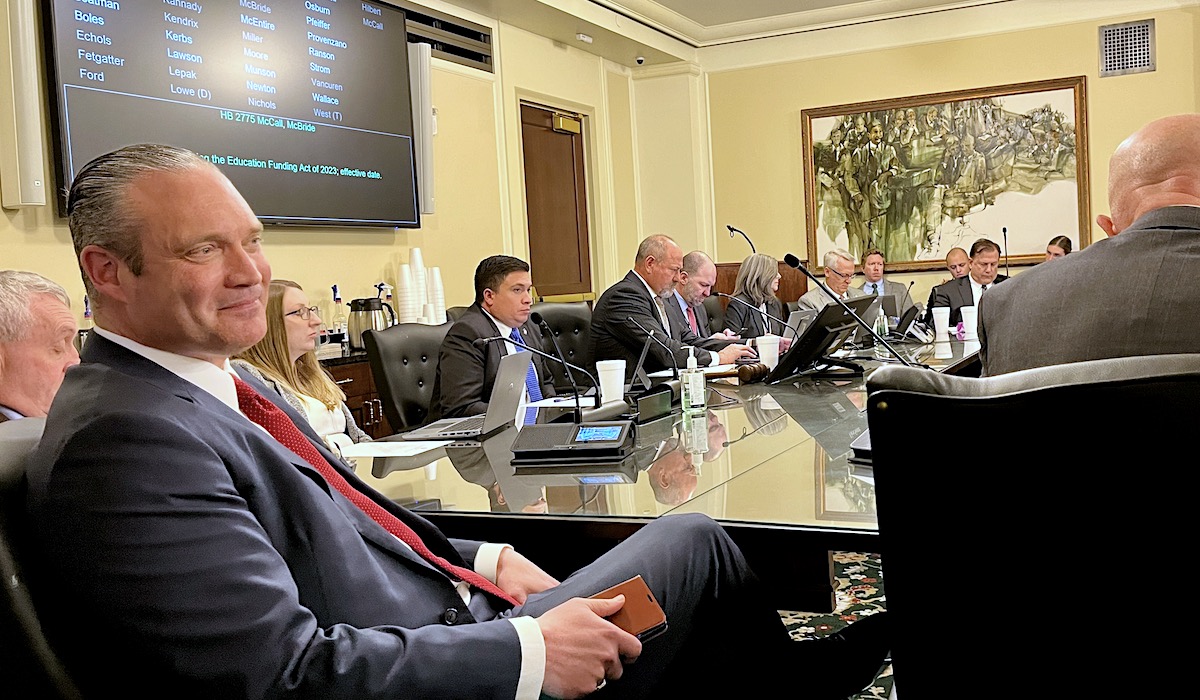
Today, the Senate and House Joint Committees on Appropriations and Budget are set to meet and are expected to advance three bills unveiled late Monday that would direct $180 million to a new “Perform Fund.” The money could provide up to five new-job-based rebate payments if a company invests at least $1 billion in a project and hires at least 1,400 new employees.
The new incentive program is believed to be tailored for Enel, an Italian energy company interested in building a solar panel plant near the Port of Inola. One of the bills appropriates $38.6 million to the Oklahoma Water Resources Board for “for upgrades to water and wastewater systems, located in Northeast Oklahoma along an inland waterway that supplies water and wastewater to major supply chain locations.”
Kisling and the Department of Commerce pitched legislators on the “Perform Fund” sometime around April 10, catching a few off guard the same week Panasonic faced a paperwork deadline for encumbering up to $698 million previously set aside in 2022 for its potential battery plant. During his regular media availability to conclude the week, Stitt called for tax cuts and said the Panasonic deal was done — until he was asked if additional legislative appropriations were needed.
“It’s the largest economic development in state history. But just talking to their board, they’ve officially signed off on that [$698 million] to encumber that to say, ‘We are coming to the state of Oklahoma,’ so that is exciting,” Stitt said before revealing that the agreement was contingent upon the additional $245 million request being appropriated this session.
When the agreement was released days later, it also revealed that Panasonic’s board has until Dec. 31, 2024, to take its final vote while the Legislature had only until June 1 of this year to make the $245 million available.
Further irritated by the document’s description that the $245 million would be “for the benefit of the company” and not specifically for infrastructure improvements at the MidAmerica Industrial Park, Thompson and other legislators soured on the situation.
“Whenever I talk to individuals that are involved — after I’ve pulled the contract off of NonDoc — they said, ‘Well, that’s not what it means,'” Thompson groused. “I said, ‘It means what it says in the contract. If that’s not what it means, then change the contract.'”
In the weeks leading up to Kisling’s resignation, questions mounted about Oklahoma’s overall strategy and coordination among state agencies — Commerce, the MidAmerica Industrial Park and the Grand River Dam Authority — and other groups, such as chambers of commerce, tribal nations and leading lobbyists.
Despite significant efforts from a variety of parties, the state’s offer to Panasonic has approached a thermal runaway, leaving onlookers to wonder if the company has requested more, if the state has fallen short, if mathematics were miscalculated, or if supply chain issues have simply inflated construction costs around the globe. Rumors that the Japanese company had concerns about Oklahoma’s strict abortion ban were dismissed by Treat, but other key negotiators said privately that the issue had been raised. Similarly, companies seeking to hire thousands of new employees must cast wide nets, and Oklahoma’s political leaders have largely opposed the mantras of diversity and inclusion.
Still, the financial details of Panasonic’s proposed $5 billion battery plant have seemed to pose the biggest challenge. As state leaders have tried to finalize the deal, a series of efforts to secure additional infrastructure investments at and around the MidAmerica Industrial Park have sputtered over the past 12 months:
- In May 2022, a session dispute between Stitt and the Legislature complicated a potential allocation of federal ARPA dollars.
- In November, the Pryor area’s local electorate roundly rejected a proposed 12-year Tax Increment Finance district that would have dedicated “up to $100 million in direct financial incentives to [Panasonic]” and “up to $50 million to fund public infrastructure improvements within the [MidAmerica Industrial Park].” (The TIF also would have dedicated “up to $150 million to the taxing entities.”)
- This year, with the $245 million number finally made public while lawmakers brawl over a bevy of other financial matters, House Speaker Charles McCall has tied the Panasonic-project appropriation to a reduction of the state’s income tax rate.
“We are always for bringing jobs and manufacturing to the state of Oklahoma, and we have indicated to the governor and the Senate that we are open to that. We think we have to pass a tax cut for the people of the state in conjunction with that,” said McCall (R-Atoka) on May 3. “I think we get there on that. I do.”
Asked about the status of the Panasonic deal, Treat said May 4 that the Legislature dedicated $698 million of potential incentive payments last year and that his Senate Republican Caucus has been “disturbed by the communication coming out of Commerce that it wasn’t consistent on that number.”
“We’re trying to drill down on what that [number] really means,” Treat said. “On the Project Connect that ended up being Volkswagen (…) going elsewhere, we talked about that $245 (million) number, but it was well defined what that [$245 million] meant: Moving the stream, getting a surface that was not movable at all, exactly level for the whole thing. So I think we can look at it. But we have not made a commitment one way or another on that [$245 million] for the Panasonic deal.”
AG rejected Commerce request for outside counsel
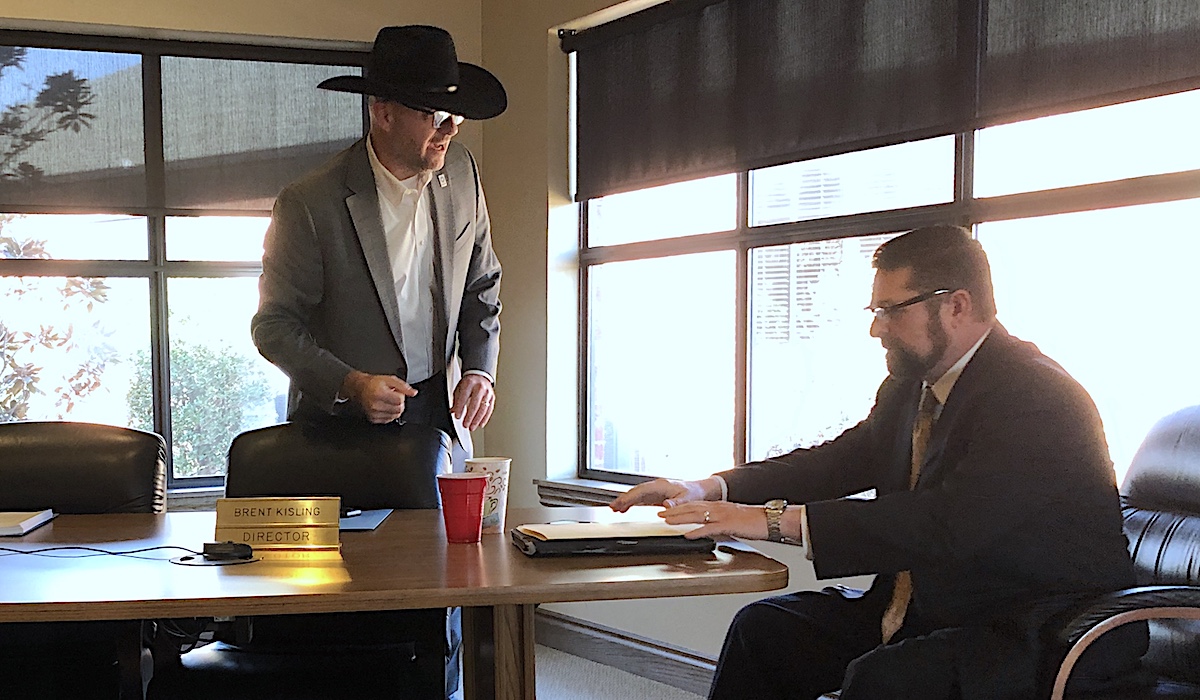
As the Department of Commerce was navigating its negotiations with Volkswagen and Panasonic back in February, the agency filed paperwork formally requesting to hire the Hartzog Conger Cason law firm for legal advice and document review regarding “the proposed location of a certain manufacturing facility in the MidAmerica Industrial Park.”
But new Oklahoma Attorney General Gentner Drummond denied the agency’s so-called “20i” request for outside counsel, instead telling Kisling that the AG’s Office “will serve as the legal representation for Commerce in this matter.”
Drummond’s April 13 rejection letter was dated the same day Kisling testified before the Senate committee, and it underscored the various inter-government complications heaped onto Kisling’s plate this spring.
During his Senate hearing, Kisling presented a 20-slide Powerpoint and noted that the Department of Commerce is well-equipped to close major business recruitment deals. However, he said the agency is somewhat hamstrung during negotiations with larger companies because keeping those discussions private can be challenging. (While speaking with reporters in February, Stitt himself let slip that the state was pursuing a separate proposed battery plant with a different large company, which turned out to be Volkswagen.)
The agency’s efforts to keep Panasonic and Volkswagen negotiations secret have been well documented.
Over the past two years, Commerce officials, other state employees, Stitt and some leading legislators had signed non-disclosure agreements regarding the Panasonic project. For months in 2022, they referred only to “Project Ocean,” calling it a potentially transformative project that could establish an entirely new business line in the state for the electric vehicle industry.
“If we can land some of these major, major companies and some of these investments, it will have a generational impact on the state of Oklahoma,” Stitt said in April 2022. “The supply chain that will follow is just unbelievable.”
Three months later, however, Panasonic announced its decision to build an electric vehicle battery plant at a site in Kansas, which had offered its own massive incentive package to land the deal. But lawmakers and the Stitt administration insisted that Oklahoma was still in the running for a second Panasonic battery plant — as well as other industry-centric projects.
When the Legislature returned this February, lawmakers tweaked the job and investment requirements of their Large-Scale Economic Activity Development Act and established an April 14 deadline for a company to commit.
After Volkswagen chose Canada, all eyes returned to Panasonic, and the company signed its contingency-containing agreement days prior to the LEAD Act deadline.
Lawmakers expect ‘ethical, legal’ practices from Panasonic
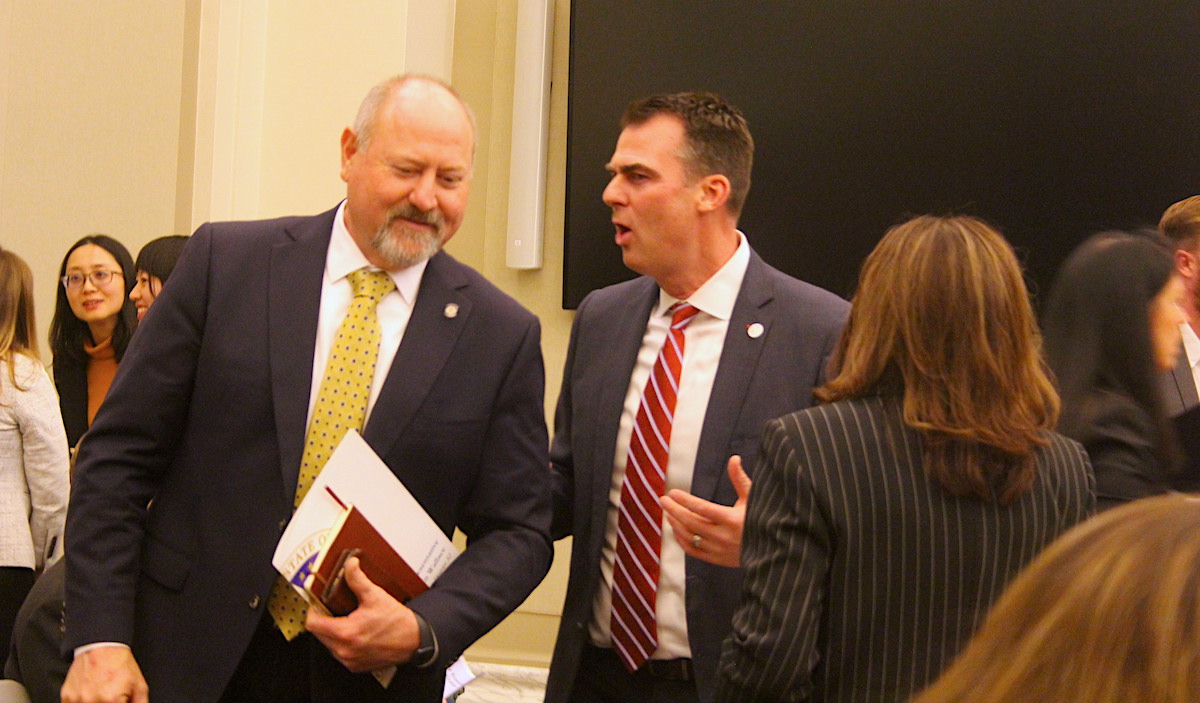
With the secrecy surrounding Panasonic’s identity eventually evaporating, questions arose about exactly what information legislators had been told about the proposed battery plant project or the company’s broader track record.
For instance, Panasonic and a pair of its subsidiaries reached plea agreements and settlements with the U.S. federal government in 2010, 2013 and 2018 on allegations related to “price fixing” and a “bribery scheme.” No member of legislative leadership at the Oklahoma State Capitol seemed to know about the cases until NonDoc learned of them from a Google search.
In reaching the settlements, Panasonic paid more than $385 million in criminal and regulatory fines to the U.S. Department of Justice and the U.S. Securities and Exchange Commission over the past 13 years. (More than a dozen associated civil cases have been adjudicated in federal and state courts as well, resulting in more than $200 million of additional settlements and judgments.)
The three primary settlements were outlined in press releases from the federal government:
- In 2010, Panasonic Corp. pleaded guilty and paid $49.1 million to the DOJ in a “price-fixing conspiracy involving refrigerant compressors.” (Whirlpool subsidiary Embraco agreed to pay $91.8 million to settle the same claims, with the DOJ saying that “Panasonic, Embraco and co-conspirators carried out the conspiracy by agreeing during meetings and conversations to coordinate prices of refrigerant compressors.”)
- In 2013, Panasonic Corp. and subsidiary SANYO Electric Co. pleaded guilty and paid the DOJ $56.3 million to settle “price-fixing conspiracies involving automotive parts and battery cells.” Panasonic and co-conspirators perpetrated “a conspiracy to fix prices of switches, steering angle sensors and automotive high intensity discharge ballasts installed in cars,” according to the DOJ. (A separate company, LG Chem, also agreed to pay a $1.1 million fine related to its agreement with Panasonic’s SANYO to fix prices on lithium battery packs used in laptop computers.)
- In 2018, Panasonic Avionics Corporation agreed to pay the DOJ a $137.4 million criminal penalty “to resolve charges arising out of a scheme to retain consultants for improper purposes and conceal payments to third-party sales agents,” according a press release. The same allegation resulted in Panasonic paying an additional $143 million fine to the SEC for “the bribery scheme,” according to an SEC press release.
Between its settlements with the DOJ and the SEC, Panasonic and its subsidiary paid $280 million for the 2018 case alone.
“Investors rightfully expect that the companies they invest in will not engage in bribery or fraud,” Antonia Chion, associate director of the SEC’s enforcement division, said in the 2018 press release. “Issuers must implement effective controls for the selection and engagement of consultants and agents to ensure compliance with anti-bribery statutes.”
Despite their prior non-disclosure agreements and numerous conversations with the Oklahoma Department of Commerce, top members of the Oklahoma Legislature said they were unaware of Panasonic’s fines and settlements with the U.S. government, which have totaled $385.8 million since 2010.
“That’s interesting. That’s more than the request for the infrastructure improvements,” said House Appropriations and Budget Chairman Kevin Wallace (R-Wellston).
Thompson, who is Wallace’s budget counterpart in the Senate, also expressed displeasure.
“I expect them to operate their business in an ethical, legal manner if they’re going to be in Oklahoma,” Thompson said.
Asked about Panasonic’s criminal and regulatory fines, Senate Minority Leader Kay Floyd inquired about Thompson’s reaction.
“I really think that’s something that we should be having (conversations about),” said Floyd (D-OKC). “I mean, that should be something on any business that we are trying to bring into the state, because if they’re going to do it in other states, they will do it here.”
Asked for comment, Department of Commerce communications director Becky Samples said any final contract with Panasonic would contain clauses protecting against illegal activity.
“When Commerce enters into any agreement with a company, there are always provisions within the contract that provide checks and balances and clawback triggers in order to protect the taxpayers of Oklahoma,” Samples said.
Wallace called that a “wise” idea.
“No one likes unfair practices,” Wallace said in April. “(We expect) straight-forward, transparent and good business practices — both dealing with the public and the state.”
House Majority Leader Jon Echols (R-OKC) said including clawback provisions in business development contracts might make sense.
“My first blush is that sounds like a good idea. I’d obviously want to think about it a little bit,” Echols said. “I’m for the Panasonic issue, I just would like to see it coupled with tax relief for Oklahomans.”
Thompson: ‘I am interested in the infrastructure’
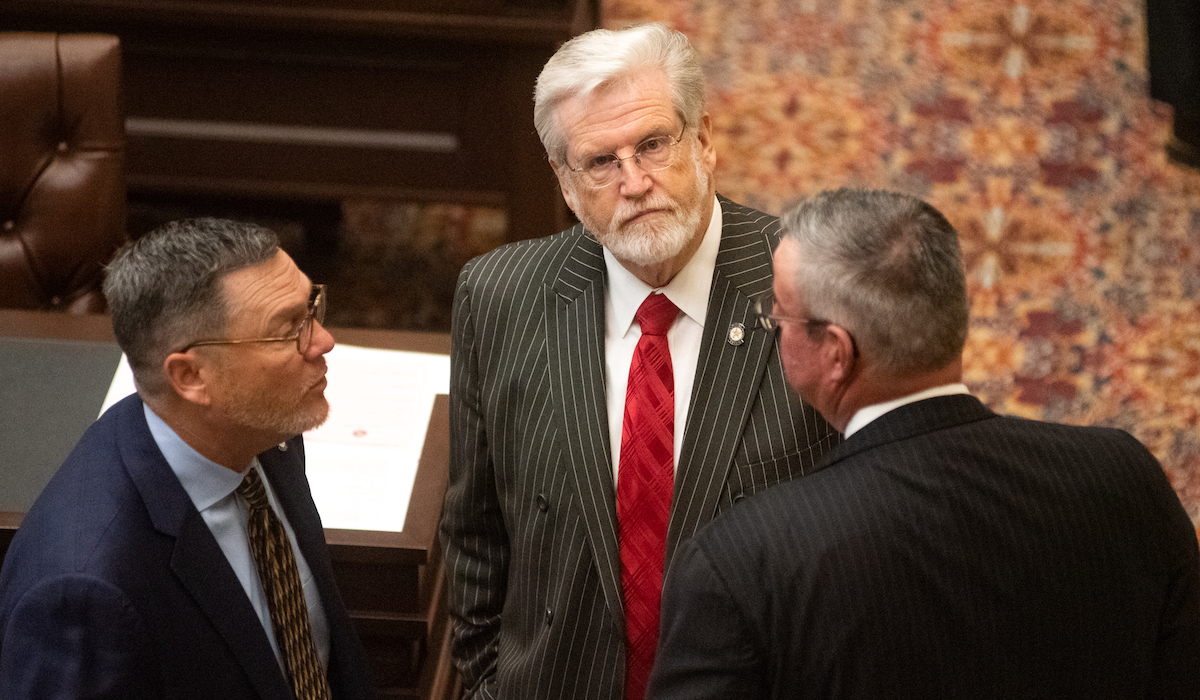
As lawmakers careen toward their May 26 constitutionally mandated adjournment deadline, Echols’ remark connecting Panasonic’s infrastructure request to “tax relief” underscores this year’s veritable Rubik’s Cube of state budget negotiations.
“A bunch of parts and pieces have got to be put together before we ever come up for an answer for one expenditure that might be $245 million,” Wallace said in April.
With weeks of dysfunction fueling rumors of special session, negotiations may have proven fruitful Monday. Stitt, McCall, Treat and other legislators held morning and afternoon discussions at the Governor’s Mansion, with former Supreme Court Justice Steven Taylor tapped to mediate the education conversation. A tentative agreement on education funding is set to be presented in the Republican caucuses of the House and Senate this morning.
Still, the major unsettled state budget elements have included:
- Education proposals that include massive public school investments coupled with a new refundable tax credit for homeschool and private school families;
- A litany of health care system investment opportunities and debt relief;
- Proposed reductions to the state’s personal and corporate income tax rates;
- The Panasonic proposal and other economic development incentive packages for Enel (an Italian manufacturer looking to build a solar panel plant near Inola) and Woodside Energy (an Australian energy producer that has proposed building a hydrogen energy plant in the Ardmore area).
McCall, Wallace and Echols — three Republican leaders of the Oklahoma House — have all said “tax relief” for Oklahoma families must occur before they support dedicating the additional $245 million for the Panasonic project.
Meanwhile, McCall and Thompson have expressed frustration with the wording of the April 11 agreement signed by Kisling and Panasonic Energy Corporation of North America executive vice president Yasuaki “Kris” Takamoto.
When he finally saw the agreement’s contingency language, Thompson bristled reading that the additional $245 million was only specified “for the benefit of the company all upon such terms and conditions that are acceptable to the company.”
“They have obligated the Legislature without speaking to the Legislature about what’s in that contract,” Thompson said. “Us going back and appropriating $245 million to be used to the benefit of the company without any explanations, speaking for Roger Thompson, I’m not interested. I am interested in the infrastructure like we talked about originally for Project Ocean. There’s got to be roads around MidAmerica, there’s got to be the moving of a rail line that’s over there, you’ve got to have a HAZMAT station that has to be opened up. We were talking about additional child care facilities in cooperation with other entities. Hospitals, those type of things. Those help everybody throughout. We also talked about water and wastewater, not only for MidAmerica and that area, but also you’ve got to go to local schools, you’ve got to go to Chouteau where folks are going to be living.
“But to come in and for Commerce to write a contract that says, ‘You will do this before June 1 for the benefit of the company?’ Uh, no.”
Echoing Thompson’s call for targeted infrastructure improvements at the MidAmerica Industrial Park, McCall was equally blunt.
“I can tell you what won’t happen. We are not cutting a check to the company for $245 million. We may be investing in our own state asset for $245 million, but that’s the state asset,” McCall said.
Asked the governor’s reaction to Panasonic’s $385 million in federal fines since 2010, a spokeswoman for Stitt’s administration said he “remains laser-focused on making Oklahoma the most business-friendly state in the nation.”
“He just returned from the SelectUSA Conference in DC where he told Oklahoma’s story to many international companies who are looking to have U.S. presence or expand their U.S. presence,” said Kate Vesper.
A request for comment from Panasonic through the company’s Oklahoma lobbyist did not yield a response prior to the publication of this article.
